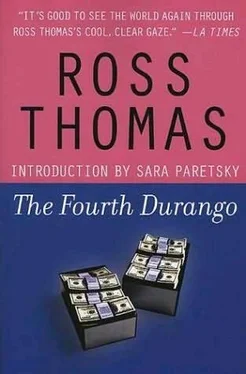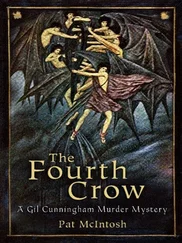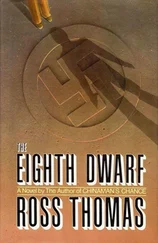“Does Trice have a wife?” Vines said, more or less answering the question with one of his own.
“He’s got a wife,” Sid Fork said and looked at Huff. “You want to go tell Virginia?”
“Not me,” Huff said.
“That’s what they pay chiefs of police for,” Bryant said. “To bear the bad news-especially when it’s to Virginia Trice.”
Fork looked at Vines. “You want to come along?”
“No, but I will.”
“Before you go, Sid,” Bryant said, looked closely at the Wells Fargo check, went around the bar, picked up the phone and tapped out a long-distance number. He waited through what Vines decided were five rings before the call was answered.
“May I speak to Ralph B. Farr, please?…Mr. Farr, this is Detective Bryant with the Durango police department…Durango, California …I’m calling to ask if any of your Wells Fargo checks were lost or stolen recently?”
After five minutes of conversation, most of it spent reassuring Ralph B. Farr that if his stolen wallet and checkbook were found, they would be promptly returned, the call ended. Bryant turned to Sid Fork.
“Somebody lifted them out of his hip pocket somewhere on Geary two weeks ago. He reported it to the cops. Which means what we’ve got here is either a wacko or a pro. If it’s a pro, he’s long gone. If it’s a wacko, well, who knows?”
“Maybe he’s both,” Vines said.
Bryant’s eyes again made their trip up and down Kelly Vines. “A professional wacko? Now that’s something to bite into.”
“I like it,” Joe Huff said.
Fork looked at his watch. “Well, we’ve got to go. You guys know what to do.”
“Yeah, we know.”
“While I’m consoling the widow Trice, get Jacoby down here and see if he can lift some prints.”
“Prints,” Bryant said and chuckled. “Prints,” he said again, as if repeating a punch line, and laughed out loud as he turned to Joe Huff. “Hear that, Joe? The chief just got off another of his zingers.”
“I’m not laughing,” Huff said, “but only because a loud laugh bespeaks a vacant mind.” He paused. “Goldsmith.”
“Paraphrased,” Vines said.
“And improved,” said Joe Huff with no trace of a smile.
When they went from the kitchen into the living room after doing the dishes-hewashed, she dried-B. D. Huckins waved Adair to the long cream couch and asked whether he’d like a brandy.
“No, thanks.”
Adair waited until she was seated in the chocolate-brown leather club chair before he lowered himself to the couch. When she crossed her legs, not carelessly, but indifferently, he glimpsed the tops of the stockings she wore instead of panty hose, which made him wonder whether garter belts had made a comeback during his fifteen months in prison.
“Tell me about that cane,” she said. “The one Sid wants.”
“It was my grandfather’s.”
“An heirloom?”
“A curiosity. He won it off a gambler in nineteen twenty just after Prohibition began. The handle unscrews and there’s a stoppered glass tube inside that holds about four ounces of hooch. That’s what he always called his liquor-hooch. After repeal in ’thirty-three our state stayed dry and my grandfather passed the cane on to my old man, who eventually passed it on to me. I would’ve given it to my son except he thought it was dumb.”
“So you passed it on to Vines.”
“For safekeeping.”
“He was more reliable than your son?”
“Just closer. Geographically. My son was in Washington; Kelly was in La Jolla.”
“And you were in Lompoc.”
“I was in Lompoc.”
“What business was he in?”
“Paul? He was a lawyer like Kelly and I, but he was never in private practice. By the time he was eighteen, maybe nineteen, he’d already decided on a career with the Federal government.”
“Your going to jail couldn’t have helped his career much.”
“Didn’t hurt it. Right after I was sentenced he got jumped up from the civil service equivalent of light colonel to brigadier general.”
Huckins’s full mouth went into its wry smile. “Washington must’ve liked his politics.”
“The current brand and Paul’s made a snug fit.”
“And yours?”
“In my family the politics of the sons has always been opposite their fathers’. My grandfather, who won the cane off the gambler, was a Debs socialist. His son-my old man-sat down and cried when Taft lost the nomination to Eisenhower in ’fifty-two.”
She leaned back in the leather chair. “So when did the vote bug bite?”
“In high school. I was a pretty fair debater and I got the notion of becoming a lawyer and maybe going into politics after I discovered how good winning made me feel. Winning anything. Later, I discovered there’s nothing like winning an election. Absolutely nothing.”
“How old were you?”
“When I first ran? Twenty-seven. I got elected county attorney, served a couple of two-year terms, sent some rich crooks to jail, got my name in the paper and then went back into private practice where I made a nice living defending the same kind of rich crooks I’d once prosecuted. When I thought I’d made enough money, I ran for the supreme court and won.”
“How much was enough?”
Adair shrugged. “Two or three million, around in there.”
“How’d you get to be chief justice?”
“The members of the court elect one of their own every four years.”
“Sounds weird.”
“It’s a weird state. After I’d served on the court four years, they always elected me for some reason.”
“For some reason,” she said.
Adair nodded and leaned forward, elbows on his knees. He made no attempt to hide his curiosity when he said, “I’m obliged to hear about it.”
“About what?”
“How you really got elected mayor.”
Huckins examined Adair dispassionately, as if he were some just-caught fish that she could either keep or toss back into the lake. Finally, after almost twenty seconds, she said, “All right.”
Adair edged forward on the couch and used his gravest voice to say, “When you come to the part where it gets nasty, Mayor, as it always does, just keep on going and don’t worry about my sensibilities.” He gave her a small smile. “Such as they are.”
B. D. Huckins said there were nine of them in the Day-Glo General Motors school bus that pulled into Durango that night in 1968. The next morning, four of them decided to stay. The other five wanted to keep heading for the Rocky Mountain Durango in Colorado. A coin was tossed. Those who were Colorado-bound called heads and won both the toss and the psychedelic bus.
Staying on in the California Durango, she said, were herself, then sixteen; her twelve-year-old half sister, Dixie Venable; Sid Fork, eighteen; and a twenty-year-old nut case who some days said his name was Teddy Jones and other days Teddy Smith.
Huckins said Teddy was a drinker and a doper who fried and pickled his brain with acid and gin and anything else he could inhale, swallow or stick in his arm. But Teddy was also the only one who had any money. When he rented a four-room house (more shack than house, she claimed) on Boatright Street out on the eastern edge of Durango in what even then was a rural slum, the other three moved in with him.
She said the communal living lasted three weeks, maybe four. It ended when she and Fork came back from the beach one afternoon. It was a real beach then, she said, with plenty of sand and not anything like it is now. Anyway, she and Fork went in the house and found the twelve-year-old Dixie naked and tied to the bed. Teddy was equally naked and drunk on gin and apparently trying to do it to Dixie with the gin bottle because, Huckins said, he probably couldn’t do it any other way.
Читать дальше












